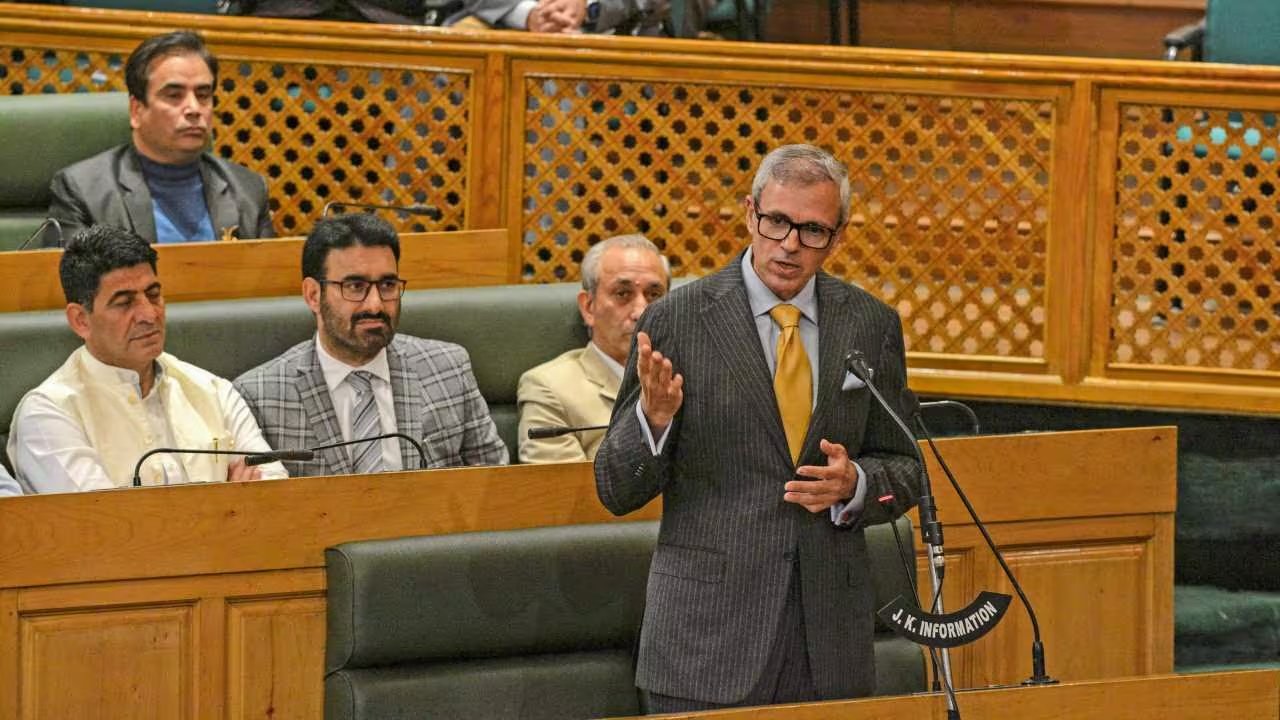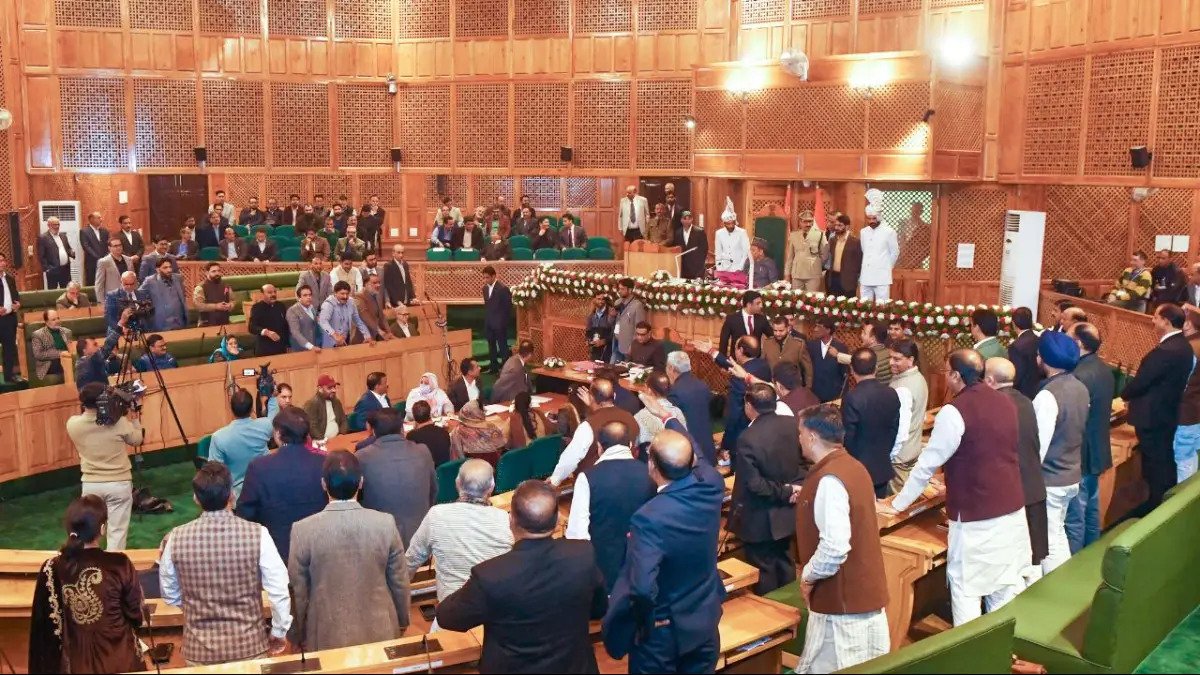Resolution on Article 370 Sparks Debate and Controversy
In a historic yet contentious move, the J&K Assembly passed a resolution advocating the restoration of Article 370, which provided special autonomy to the region until its revocation by the central government in August 2019. The session was anything but calm; BJP legislators protested loudly,
tearing copies of the resolution and accusing the National Conference-led government of promoting a “pro-Pakistani agenda.”
BJP’s Outrage: Slogans and Protests Rock the Assembly
Amid the resolution’s passage, BJP lawmakers raised slogans, including “Jai Shri Ram,” “Vande Mataram,” and “Anti-National Agenda Nahi Chalega,” reflecting their strong opposition. These protests led to multiple disruptions and even an adjournment of the House,
as tensions rose between the BJP and National Conference members.
The BJP members argued that the National Conference-led coalition government was acting against national unity, and they accused the Speaker of being biased. The opposition’s uproar underscored the party’s stance that the abrogation of Article 370 is a non-negotiable step toward national integration.
Allegations of Partisanship Against the Speaker
The proceedings became even more turbulent when Leader of Opposition Sunil Sharma accused the Speaker of being partial. Sharma alleged that the Speaker held private meetings with ministers to draft the resolution, effectively working in collusion with the National Conference.
Another BJP MLA, Sham Lal Sharma, also questioned the neutrality of the Speaker, suggesting that the resolution was pre-planned in coordination with National Conference leaders. According to Sharma,
the Assembly polls had shown a clear mandate against Article 370, as BJP had garnered 26% of votes compared to NC’s 23%. He asserted that the Speaker’s actions did not represent the people’s will.
Details of the Article 370 Resolution Passed by Voice Vote
The resolution was introduced by Deputy Chief Minister Surinder Choudhary, who emphasized the need to restore the special status and constitutional protections that previously safeguarded J&K’s unique identity, culture, and rights. The document stated, “This Assembly reaffirms the importance of the special status and constitutional guarantees, which safeguarded the identity, culture, and rights of the people of Jammu and Kashmir,
and expresses concern over their unilateral removal.”
The resolution urged the Government of India to initiate a dialogue with elected representatives of Jammu and Kashmir, focusing on reinstating Article 370 and other constitutional provisions. Additionally,
it stressed that any restoration process should prioritize both national unity and the region’s aspirations.
National Conference Defends Resolution, Cites Cultural Identity
The National Conference, led by Chief Minister Omar Abdullah, defended the resolution, arguing that the special provisions under Article 370 had historically safeguarded the cultural and political identity of J&K. The party stated that restoring Article 370 would help protect the region’s distinctive status within the Indian Union while respecting its historical context.
The National Conference leaders contended that the decision to revoke Article 370 in 2019 had disregarded the will of the people, and a meaningful dialogue with the central government was necessary to address these concerns. They argued that Article 370 was essential for maintaining a balance between national unity and local identity.
BJP’s Stand: ‘August 5 Zindabad’ and Calls Against Anti-National Agenda
BJP MLAs responded with fervor, raising slogans like “August 5 Zindabad,” celebrating the day Article 370 was abrogated. BJP leaders maintained that the Article’s revocation was a step toward ending the discrimination that J&K had faced under previous political dispensations. They argued that restoring Article 370 would send the wrong message about the region’s integration with India.
The party also alleged that the resolution promoted a “Pakistani agenda,”
challenging the government’s intentions. The BJP lawmakers highlighted that any efforts to reinstate Article 370 could embolden anti-national elements,
risking the region’s security and stability.

Accusations of Collusion and Partisanship: The Politics Behind the Resolution
Both sides exchanged heated accusations. While BJP leaders accused the National Conference of pursuing an “anti-national agenda,”
National Conference members countered, arguing that their actions reflected the region’s legitimate concerns. They emphasized that the Speaker’s support for the resolution was within his mandate, dismissing the BJP’s claims as political posturing.
The opposition claimed that the resolution was crafted in secret meetings at guest houses,
asserting that the Speaker acted as a representative of the National Conference rather than as a neutral figure. These accusations deepened the divide, with both parties vying for the public’s support.
Implications of the Resolution for J&K and National Politics
The passage of this resolution has significant implications for the political landscape of Jammu and Kashmir and India at large. For one, it reflects the ongoing divide between regional aspirations and national integration. The BJP’s strong response to the resolution shows that the debate over Article 370 is far from over, even four years after its abrogation.
The resolution also underscores the continuing influence of Article 370 in J&K’s political discourse. By calling for the restoration of special status, the National Conference has rekindled a central issue that resonates deeply within the region, potentially setting the stage for future electoral battles.
Call for Dialogue: A Path Forward or Political Rhetoric?
The resolution calls on the central government to initiate dialogue with J&K’s elected representatives,
stressing that such a dialogue is essential for addressing regional grievances. However, it remains unclear if the central government would entertain such discussions. Given the BJP’s strong stance, any move toward restoring Article 370 seems unlikely in the near future.
Nevertheless, the resolution’s call for dialogue has rekindled hope among those who believe that engaging with local leaders is key to achieving a lasting solution. But others view this as mere political rhetoric,
questioning whether it will lead to tangible changes on the ground.
Conclusion
The recent events in the J&K Assembly underscore the enduring sensitivity around Article 370. While the National Conference pushes for the restoration of special status, the BJP remains steadfast in its opposition. This divide reflects broader issues of national identity, autonomy, and regional aspirations,
which continue to shape J&K’s political landscape.
As the situation unfolds, it’s clear that the Article 370 debate will remain a significant issue for Jammu and Kashmir. Whether through dialogue or continued opposition, the path forward will depend on both regional demands and national priorities. For now,
the resolution’s passage marks a symbolic yet contentious chapter in the ongoing narrative of Jammu and Kashmir’s place within the Union of India.







